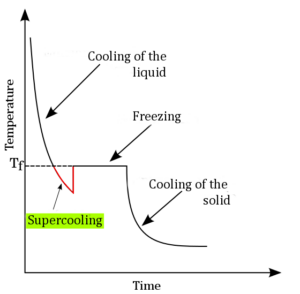Lab testing indicates that the PCM used in Cool Cube™ Lab Freezer panels is subject to “supercooling” (a natural phenomenon). Supercooling is when a liquid remains in a liquid state at a temperature below its standard freezing point. Although extensively studied by scientists and researchers, supercooling is not entirely understood and remains an active area of scientific research.
 The basic principles of supercooling are well-known, including several factors that contribute to the occurrence (the purity of the liquid, impurities, nucleation sites, and pressure). However, why certain liquids can remain supercooled for extended periods without freezing is still being researched.
The basic principles of supercooling are well-known, including several factors that contribute to the occurrence (the purity of the liquid, impurities, nucleation sites, and pressure). However, why certain liquids can remain supercooled for extended periods without freezing is still being researched.The most common example of supercooling is water in the atmosphere. In a state of high purity, water droplets in clouds can remain liquid even at temperatures below freezing. When these supercooled droplets encounter a solid surface, such as an airplane wing or a tree branch, they can freeze instantly, creating a phenomenon known as freezing rain or glaze ice.
In the case of the Cool Cube™ @ Lab Freezer Temps phase change material, occasionally, the PCM lacks a crystallization-inducing seed, subjecting the material to supercooling occurrences down to -27°C/-16.6°F. So even though Lab Freezer PCM Panels have a melting point of -21.5°C/-6.7°F, they may still be liquid and not solidify at -27°C/-16.6°F. Therefore, the recommendation is to freeze the Lab Freezer PCM panels in an environment at or below -30°C/-22°F to overcome the chance of supercooling and get them into a solid state before pack-out.
VeriCor’s Cool Cube™ Lab Freezer PCM material has not changed only the temperature recommendation. The same high-quality, fully-saturated aqueous salt-based phase change material is being used. Freeze/thaw cycling data indicates 10,000+ cycles yielding acceptable results, leading to years of use. (Note: frequency and quantity do not appear to impact supercooling or the PCM melting point.)
Tips on troubleshooting “Lab Freezer” PCM panels:
- Use a freezer at or below -30°C/-22°F to freeze panels.
- Lay panels flat when freezing.
- Shake panels to check for liquid/solid PCM (which may disturb the liquid enough to initiate a crystallization process).
- Use Prep Method B (dry ice) if a -30°C/-22°F freezer is unavailable.
- When panels contain liquid PCM, the warming rate of a Cool Cube™ is roughly 1°/hr.
- i.e., Starting with liquid panels at -20°C, the Cool Cube™ will warm up to -15°C in roughly 5 hours in a room temperature environment.
Find more information regarding Cool Cube™ usage in the User Guide (digital version here) and uploaded videos/pdfs.



You must be logged in to post a comment.